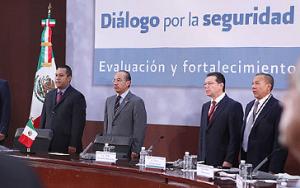Consequences of Prohibition
Drug War Issues
Politics & Advocacy
Mexican President Felipe Calderon has made his war against his country's so-called drug cartels the centerpiece of his presidency. But with prohibition-related violence at record levels and with his single six-year term already past the halfway point, Calderon's ability to get what he considers key reforms through the Mexican legislature is in doubt, and so is his legacy.

Felipe Calderon -- already a lame duck?
One measure would reform policing by placing the 22,000 municipal police agencies under the control of state governors. The municipal agencies are notoriously susceptible to the threats and entreaties of the cartels, who are fighting the government and each other to control lucrative smuggling franchises.
The other measure would strengthen money laundering legislation in a bid to hit the cartels in the wallet. A bill he announced in August is aimed at getting the government's hands on a larger share of the estimated $40 billion a year in cartel revenues.
But despite the climate of crisis provoked by the daily drumbeat of shoot-outs, kidnappings, beheadings, and other acts of horrorific exemplary violence, Calderon's agenda is running up against political calculation and is stalled and in danger of dying without being enacted. With the political parties jockeying for position ahead of elections in 2012, and with dissension within his own ruling PAN, Calderon's reform proposals will most likely be watered down significantly if they are passed at all.
"There is no consensus among lawmakers, not even within the PAN. There is a lot of opposition to the proposal for a unified police command," PAN Senator Alejandro Gonzalez, who heads the Senate's justice committee, told Reuters.
"The Mexican Congress has used its newly acquired power not to push through modernizing reforms but rather to control and thwart the executive at every turn," said political analyst Denise Dresser.
Calderon tried to fight back last week, telling reporters the money laundering reforms and the unified police command "are the key to our security." He emphasized the money laundering provisions, saying, "The goal is to hit the criminals where it hurts most, on the economic front."
While the money laundering reforms have more support than the police reforms, they still face an uphill battle. "The president introduced this initiative with a lot of force but it got stuck in the Senate," Jose Trejo, the PAN senator who heads the finance committee, told Reuters. "If it passes, it will only be with various changes. It will be complicated in this session."
Calderon and the PAN need the support of the main opposition party, the PRI, to get his reforms through the congress. But neither the PRI nor the leftist PRD are likely to hand Calderon any legislative victories before the 2012 elections. Congress will recess on December 15 without having moved on the legislation, and the prospects for passage next year are even dimmer.
This work by StoptheDrugWar.org is licensed under Creative Commons Attribution-ShareAlike 4.0 International
Comments
Politics
So-called "drugs" and so- called "politics" go hand in hand in Mexico. Who actually "controls" the "substances"? Is it Washington,D.C.? Probably not.
Add new comment